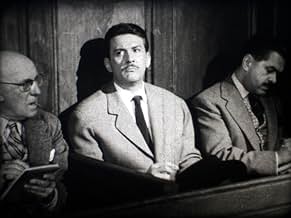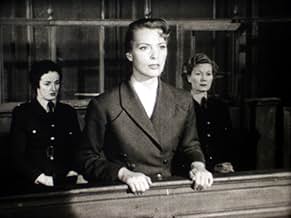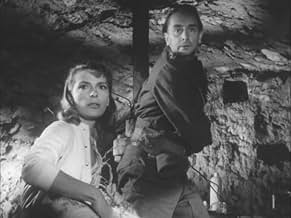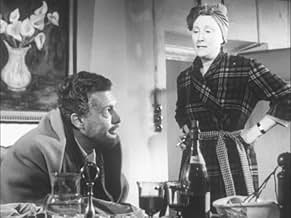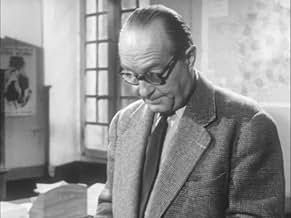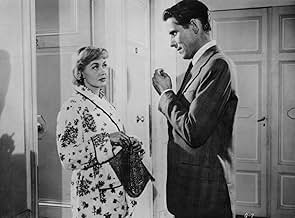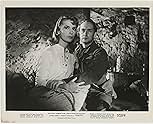Je plaide non coupable
- 1956
- Tous publics
- 1h 33min
NOTE IMDb
5,9/10
136
MA NOTE
Ajouter une intrigue dans votre langueA Frenchwoman accused of the murder of her child's father in an English court, rejects her defence lawyer. At the request of a Frenchman who saved his life during the war, a family solicitor... Tout lireA Frenchwoman accused of the murder of her child's father in an English court, rejects her defence lawyer. At the request of a Frenchman who saved his life during the war, a family solicitor reluctantly takes on the case.A Frenchwoman accused of the murder of her child's father in an English court, rejects her defence lawyer. At the request of a Frenchman who saved his life during the war, a family solicitor reluctantly takes on the case.
- Réalisation
- Scénario
- Casting principal
Andrée Debar
- Vicki Martin
- (as Andree Debar)
André Mikhelson
- Santos
- (as Andre Mikhelson)
Félix Clément
- Maire Gimelet
- (as Felix Clement)
Marcel Lupovici
- Valdi
- (as Lupovici)
Avis à la une
Part murder mystery, part thriller, part courtroom drama- this odd little film has a well-intentioned foot in each of these camps without nailing any particular genre. The unimaginative title doesn't help. That said, it's an enjoyable curiosity shown from time to time on TPTV, and John Justin scrubs up very nicely as our clean-cut English hero among a collection of French and Brit character actors; one of our favourite B-film cockneys of the time, Sydney Tafler, plays an Italian-sounding character who's witness statement is critical to the narrative- delivered in a peculiarly unconvincing French accent. As always, interesting to see who else crops up- the great Donald Wolfit as the judge, and Russell Napier (who is nearly always playing a police inspector), playing - er - a police inspector.
This was one of the post war recrimination films that proliferated in the 1950s.A man is found dead in a hotel.The accused woman had the opportunity and the motive to kill him.However as everyone knows that tends to be a sign of innocence.She is arraigned at the Old Bailey in front of that veteran scene stealer Donald Wolfit who plays a garrulous judge,who is going to make the best of his part.Her solicitor,instead of sitting behind counsel at the trial,goes off to France to try and solve the mystery.The problem about this film is that it is continually drifting into flashbacks so it is often difficult to work out a clear continuity of plot.
The British TV channel Talking Pictures recently screened this film. It wasn't perfect quality, and twice I had stop my recording, reverse and freeze to read a scribbled note.
The plot was divided between a hotel where a murder took place, a courtroom at London's Old Bailey and France (with echoes of the German occupation). It was not at all bad, though a couple of times I did wonder how the French reporter had come up with information to progress the investigation he was making with his friend Nat Rumbold.
As always with court dramas, one might wonder at some of the legal procedures, not least the last-minute intervention. And there were one or two scenes that could have been improved, such as that with the out-of-control car, when interior reaction shots of Nat realising he had a problem could have been effectively added.
But overall the film was good enough to have merited a better-known cast. Donald Wolfit (later to be knighted) as the judge was the biggest - indeed the only big - name, and there was a sprinkling of familiar British character actors.
Everyone acquitted themselves well enough.
It would appear that the film was released in both English and French, and a poster on IDMB gives prominence to the French actors.
The plot was divided between a hotel where a murder took place, a courtroom at London's Old Bailey and France (with echoes of the German occupation). It was not at all bad, though a couple of times I did wonder how the French reporter had come up with information to progress the investigation he was making with his friend Nat Rumbold.
As always with court dramas, one might wonder at some of the legal procedures, not least the last-minute intervention. And there were one or two scenes that could have been improved, such as that with the out-of-control car, when interior reaction shots of Nat realising he had a problem could have been effectively added.
But overall the film was good enough to have merited a better-known cast. Donald Wolfit (later to be knighted) as the judge was the biggest - indeed the only big - name, and there was a sprinkling of familiar British character actors.
Everyone acquitted themselves well enough.
It would appear that the film was released in both English and French, and a poster on IDMB gives prominence to the French actors.
This film soon splits into two parallel narratives; one a rather stolid courtroom drama with an eclectic cast of Britons ranging from Donald Wolfit as the judge to Betty Stockfield as a shifty witness, the other populated largely with French actors and slickly shot by director Edmond Greville following hero John Justin to France in search of evidence exonerating a former resistance heroine.
Based on a novel by Michael Gilbert (originally part of his Inspector Hazelrigg series), the plot is often hard to follow and the final payoff a bit of a letdown, but you keep watching.
Based on a novel by Michael Gilbert (originally part of his Inspector Hazelrigg series), the plot is often hard to follow and the final payoff a bit of a letdown, but you keep watching.
A strange french film that I saw dubbed, from an US source. It begins like a court drama, where a young woman is accused of a murder and claims her innocence. A journalist tries to prove her not guiltiness. And the films curiously becomes from time to time an actionner, with some gunfights sequences. Not a bad feature, but that I will forget in a couple of weeks, or maybe days. I don't know any of the actors, male or female. It may be a sleeper at some moments, so stay tuned if you want to follow the story in an accurate way. The director was a man who made films in different countries: UK, USA and France. His best known feature was LES MAINS D'ORLAC.
Le saviez-vous
- AnecdotesVeteran extra Aileen Lewis is not only the policewoman standing in the dock behind Andrée Debar, she's also in the public gallery sitting towards the back on the right hand side of the screen.
- GaffesWhen Rumbold is photographed leaving the post office, the photographer is to his right but the photograph shown soon after was clearly taken from his left.
- ConnexionsReferenced in Sous le plus petit chapiteau du monde (1957)
Meilleurs choix
Connectez-vous pour évaluer et suivre la liste de favoris afin de recevoir des recommandations personnalisées
Détails
- Date de sortie
- Pays d’origine
- Langues
- Aussi connu sous le nom de
- Guilty?
- Lieux de tournage
- Beaconsfield Film Studios, Station Road, Beaconsfield, Buckinghamshire, Angleterre, Royaume-Uni(studio: made at Beaconsfield Studios)
- Sociétés de production
- Voir plus de crédits d'entreprise sur IMDbPro
- Durée1 heure 33 minutes
- Couleur
- Rapport de forme
- 1.37 : 1
Contribuer à cette page
Suggérer une modification ou ajouter du contenu manquant

Lacune principale
By what name was Je plaide non coupable (1956) officially released in Canada in English?
Répondre
